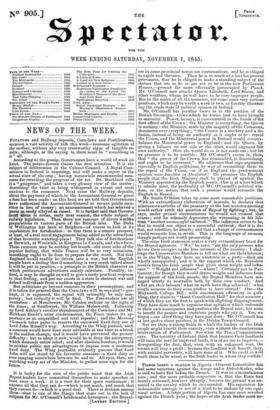NEWS OF THE WEEK.
POTATOES and Railway deposits, Corn-laws and Fortifications, occasion a vast activity of talk this week—immense agitation at the surface, without any very trustworthy signs of tangible re- sults; although, as the saying is, there must be " something in it" all.
According to the gossip, Government have a world of work on hand. The potato-disease claims the first attention. It is the subject of deliberation in the Cabinet Council. A Royal Com- mission in Ireland is inquiring, and will make a report on the actual state of the crop ; having meanwhile recommended mea- sures for retarding the progres.Jof the rot. Dr. Buckland calls it a "gangrene," and takes a very gloomy view of the matter ; describing the taint as being widespread in extent and most noxious to the consumer. Next come the Railway deposits, about the payment of which to the Accountant-General so great a fuss has been made : on this head we are told that Government have authorized the Accountant-General to receive public secu- rities in lieu of money ; an announcement which has relieved a panic as easily allayed as raised. It is further said that Govern- inean to revise, early next session, the whole subject of railway legislation. Then there are rumours of divers warlike preparations in various parts of the British isles. The Duke of Wellington has been at Brighton—of course to look at its capabilities for fortification : so that there is a remote prospect, at least, of a real naval engagement being added to the attractions of that favourite watering-place 1 They talk also of fortifications at Berwick, at Woolwich, at Kingston in Canada, and elsewhere. These rumours may be nothing but breath—the mere echo of the popular feeling, that while France will be so very minacious, something ought to be done to prepare for the worst. Not that England would readily be driven into a war ; but the English people have a feeling that if something is very much talked about it will be put in practice,—a principle in the British character on which pertinacious advertisers mainly calculate. Possibly, in- deed, it may be thought as well to give a tardy practical response to that feeling, and put our coasts in a state to obstruct war and defend individuals from a sudden aggression. But politicians go beyond rumours in their presumptions, and it is taken for granted that the Corn-laws will be repealed 1—per- haps, it is supposed, the repeal will ostensibly be only tem- porary; but virtually it will be final. The Free-traders are all exultation : at Manchester, Mr. Cobden reckons up the signs of the times; at Southwark, Sir William Molesworth. Following up Lord Ashley's cavalier abandonment of the Corn-laws and Mr. Bickham Escott's utter condemnation, the Times makes its ap- pearance as an unqualified and total repealer ; and the Morning Chronicle takes pains to remove the untoward fixed duty out of Lord John Russell's way. According to the Whig journal, such a measure would have been most advisable at one time as a break to the sudden change, and it would have prevented the present difficulty : but to adopt it now, would he to deny the emergency, Which demands entire relief; and after absolute freedom, it would be neither politic nor advantageous to impose even a moderate fixed duty. The Whig journalist evidently guesses that Lord John will not stand by his favourite measure—a fixed duty on corn ranging somewhere between Ss. and Os. All eyes, then, are watching every act of the Minister, to gather some sign for the future.


























